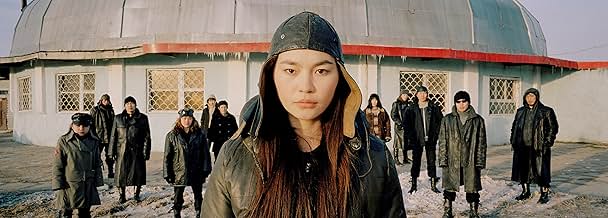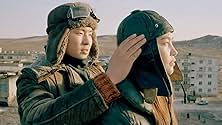Adicionar um enredo no seu idiomaSet in the frozen steppes of Mongolia, a young nomad confronted with his destiny after animals fall victim to a plague which threatens to eradicate nomadism.Set in the frozen steppes of Mongolia, a young nomad confronted with his destiny after animals fall victim to a plague which threatens to eradicate nomadism.Set in the frozen steppes of Mongolia, a young nomad confronted with his destiny after animals fall victim to a plague which threatens to eradicate nomadism.
- Direção
- Roteiristas
- Artistas
- Prêmios
- 16 vitórias e 5 indicações no total
- Direção
- Roteiristas
- Elenco e equipe completos
- Produção, bilheteria e muito mais no IMDbPro
Avaliações em destaque
I have just seen this film, and my opinion of it is mixed.
On the one hand, the film gives a detailed and intimate view of Mongolian life, especially in the first part; moreover, there is a strong political message behind it, which leads to some disturbing and powerful images (nothing too shocking).
On the other hand, everything is filmed in such a tediously slow manner that it becomes either mesmerizing or simply boring. Unfortunately, in my case, the whole audience including myself were not mesmerized. Moreover, toward the ending, the film becomes more and more surreal, which for me personally did not lead to a satisfied feeling at the actual end.
All in all, if you enjoy watching empty lands and silent people for a long time, you may be able to enjoy the positive aspects of this film. If, like me, you like films with at least the outline of a well-defined story and the feeling that you somehow understood what you just saw, this might not be the film for you.
On the one hand, the film gives a detailed and intimate view of Mongolian life, especially in the first part; moreover, there is a strong political message behind it, which leads to some disturbing and powerful images (nothing too shocking).
On the other hand, everything is filmed in such a tediously slow manner that it becomes either mesmerizing or simply boring. Unfortunately, in my case, the whole audience including myself were not mesmerized. Moreover, toward the ending, the film becomes more and more surreal, which for me personally did not lead to a satisfied feeling at the actual end.
All in all, if you enjoy watching empty lands and silent people for a long time, you may be able to enjoy the positive aspects of this film. If, like me, you like films with at least the outline of a well-defined story and the feeling that you somehow understood what you just saw, this might not be the film for you.
I saw the film only yesterday, yet my impression at the end of it has not changed. It is certainly a film containing beautiful images of snow covered plains and wastelands in Mongolia. And in the beginning there is some promise of yet another quiet, elegiac tale of wide plains, nomads and their wisdom. But this quietist expectation soon is shattered, and the viewer, together with the film's protagonists, is thrown out of this sub-zero garden of Eden. What follows still remains beautiful and striking in its imagery, but annoyed me more and more because of the loosening up of the structure and ever more unexpected twists and turns, until, really, I reached the point where it got very hard to be bothered at all. Though I am not against experiments and boldness, this attempt at a poetic film of a conflict between tradition and modernity was lost on me, mainly because its makers apparently could not decide between impressionist documentary, expressionist story-telling and a superficial interest for the folklore of the supernatural.
One of world cinema's biggest virtues is that it allows us to have a personal vision of distant places where it would be difficult for us to travel due to various reasons. Mongolia is one such remote area which has caught the attention of various film directors as many films have been set in this vast central Asian nation ever since it was popularized in 1989 by renowned German director Ms. Ulrike Ottinger through her film "Johanna D'Arc of Mongolia". Mongolia is honestly represented by ethnographic filmmakers Peter Brosens and Jessica Woodworth. Khadak is not a documentary film but it has made good use of a lot of documentary cinema's conventions to get closer to reality. Although the main story moves slowly, there are plenty of minor stories to keep in check the viewers' attention. These stories are an excellent initiation into the lives of people in Mongolia as each story represents an event related to the lives of the protagonists. One needs to watch this film if one's knowledge of ethnographic films is restricted uniquely to films made by Jean Rouch.
I'd like to share my positive impressions from this movie. I've just seen it on Sofia Film Festival and I find it truly amazing. It deals with some topics about life and humanity in totalitarian Soviet-dominated societies - in a way that is both just and powerful. Being a Bulgarian that have witnessed totalitarian rule's disregard for the human individual - I find this movie a powerful reminder of how vital yet fragile our relations to nature and traditions are. Acting is brilliant - especially the lead character. There is a well done balance of landscape, color and contrast that make this movie visually outstanding. What did put me off a bit - and made me reduce my vote to a 8/10 mark - were a couple of scenes at the end of the movie that, though meaningful and powerful, do brake the overall balanced and well-programmed dynamics of the whole movie - and i think that if they were cut out - it would only have improved and boosted this movie's basic messages to the viewer... I find this line in the synopsis "animals fall victim to a plague which threatens to eradicate nomadism" irrelevant, misleading and diminishing authors' main ideas... Overall - a great movie...
I saw a screener DVD of this, but would love to see it on the big screen. A heartbreaking story of the nomadic peoples of Mongolia being forced to abandon their homes due to a "plague" outbreak among animals. Despite their own herds being healthy, the family who is the focus of the beginning of the film are forcibly moved to a mining town, where their son Bagi, who has visions of his ancestors is forced to work for a pittance. Other nomads have been detained for offenses like playing music publicly. The only food available seems to be potatoes, but there appears to be meat available on the black market, and this feeds speculation that the clearances were not motivated by animal sickness after all. Bagi is arrested and while in the detention center meets a group of young activists who want to rebel against their unlawful imprisonment, and to free the animals they know are still alive. The song they perform is a high point of the film, and adds to an already excellent score and soundtrack.
This story does not have an entirely happy ending, but there is some measure of hope and redemption here. The film's strength lies in its very simple visuals and minimal dialogue, which powerfully portray a way of life that is dying out due to government interference.
This story does not have an entirely happy ending, but there is some measure of hope and redemption here. The film's strength lies in its very simple visuals and minimal dialogue, which powerfully portray a way of life that is dying out due to government interference.
Você sabia?
- Erros de gravaçãoIn the shots where the Shamaness is smashing the liquor bottles on the ground, several of them bounce, or just break into a few pieces, but the sound effect is still that of a bottle shattering to bits.
- Trilhas sonorasMother Mongolia
Written by Altan Urag
Performed by Altan Urag
Principais escolhas
Faça login para avaliar e ver a lista de recomendações personalizadas
Detalhes
- Data de lançamento
- Países de origem
- Idioma
- Também conhecido como
- Suyun Rengi
- Locações de filme
- Empresas de produção
- Consulte mais créditos da empresa na IMDbPro
Bilheteria
- Orçamento
- € 3.000.000 (estimativa)
- Faturamento bruto nos EUA e Canadá
- US$ 3.139
- Fim de semana de estreia nos EUA e Canadá
- US$ 1.983
- 14 de out. de 2007
- Faturamento bruto mundial
- US$ 37.781
- Tempo de duração
- 1 h 44 min(104 min)
- Cor
- Mixagem de som
Contribua para esta página
Sugerir uma alteração ou adicionar conteúdo ausente


















